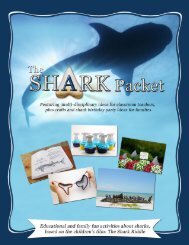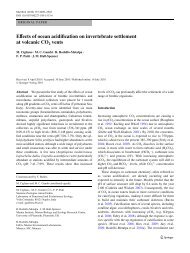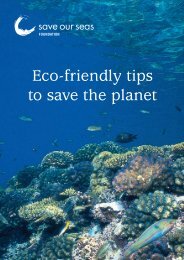South Africa's White Shark cage-diving industry - Save Our Seas ...
South Africa's White Shark cage-diving industry - Save Our Seas ...
South Africa's White Shark cage-diving industry - Save Our Seas ...
Create successful ePaper yourself
Turn your PDF publications into a flip-book with our unique Google optimized e-Paper software.
<strong>South</strong> Africa’s <strong>White</strong> <strong>Shark</strong> <strong>cage</strong>-<strong>diving</strong> <strong>industry</strong> -<br />
is their cause for concern?<br />
The implications of this discovery are critical to the management of <strong>cage</strong> <strong>diving</strong>. The fact that<br />
white sharks very often fail to respond to chumming stimulus may alternatively be indicative<br />
of possible 'negative' conditioning. <strong>White</strong> sharks who fail to gain rewards whilst investigating<br />
such chum slicks, may, over time, stop responding to what is effectively a false promise of<br />
food. Importantly, this provides evidence that if white sharks do not receive food rewards<br />
when visiting a <strong>cage</strong> <strong>diving</strong> vessel, then the possibility of positive conditioning is removed. At<br />
False Bay, it is also suspected that white sharks fail to respond to a chumming vessel, as the<br />
initial olfactory stimulation (or the chum slick) indicates a 'less attractive' scavenging<br />
opportunity in comparison to hunting and feeding on live prey. We thus concluded that the<br />
majority of sharks at Gansbaai and False Bay have such limited exposure to chumming<br />
vessels (either through limited residency or limited response) that they do not currently learn<br />
to associate <strong>cage</strong> <strong>diving</strong> boats with food.<br />
Despite the majority of evidence suggesting minimal impact of <strong>cage</strong> <strong>diving</strong> on the behaviour<br />
of white sharks, some<br />
evidence of positive<br />
conditioning does exist.<br />
Following close<br />
inspection of the<br />
behaviour of individual<br />
sharks at Mossel Bay,<br />
we realised that four<br />
sharks were observed<br />
consistently at the <strong>cage</strong><br />
<strong>diving</strong> vessel, and they<br />
gained more food during<br />
visits than other sharks<br />
(Spearman's rank, (rs)<br />
0.05(2), 124 = 0.290, p <<br />
0.01, Highly Significant)<br />
(Fig. 7). The<br />
experiences of these<br />
Figure 7. Relationship between 'reward predictability' and 'regular<br />
presentation' of easily recognisable sharks. Inserted boarder<br />
indicates four Mossel Bay sharks that had both high 'experience' and<br />
high 'feeding likelihood'.<br />
four sharks were unique, in that they fulfilled the requirements for conditioning by gaining<br />
'predictable rewards' at 'regular intervals'.<br />
Although these sharks did gain a noticeable amount of food rewards over many days, was<br />
there any indication that their behaviour was consequently altering? To assess this we<br />
tracked changes in 'speed of arrival' (minutes between start of chumming and arrival of<br />
shark), 'percentage in contact' (percentage of time between first and last sighting of a shark<br />
that it was visible at the boat), 'feeding motivation' (ratio of circles, passes and attempts at<br />
bait), and 'attempts at bait' (number of attempts to consume bait during a visit). These sharks<br />
did not appear to become more motivated to acquire the bait as would be indicated at<br />
Pg 49<br />
ANNEXURE 1






